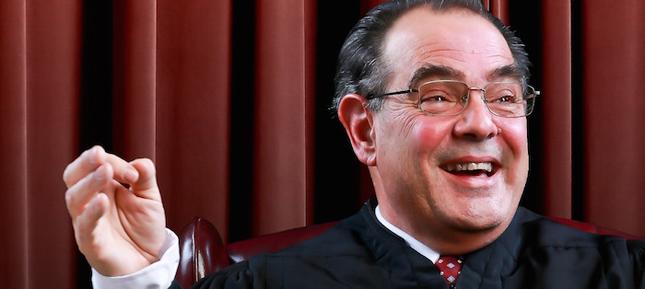Who knew that Supreme Court Justice Antonin Scalia could be such an entertaining curmudgeon?
Justice Scalia probably does—after all he’s been known to act out a little on the court and he’s a huge opera buff—especially of the Verdi and Puccini kind—where acting out is an art form.
And playwright John Strand seems to think so—in his new play “The Originalist,” now in the Kogod Cradle of Arena Stage, he gives us a voluble, combustible Scalia sparring loudly, with strands of mercy, with a vocal, emotional self-described liberal law clerk. Scalia dominates the stage when he’s on it, which is as it should be.
Actor Edward Gero surely knows that, and a lot more, as he embodies the most lightning-struck justice on the court, the ultra-conservative darling of the right, the son of Italian immigrants, the family man, brilliant, the charismatic, funny, unrepentant and self-described defender of the United States Constitution.
Gero—who in his full maturity has taken on characters as diverse as the volatile artist Mark Rothko and Ebenezer Scrooge—dives into the character of Antonin Scalia (with due diligence of research and sitting in on Supreme Court sessions) as if it was a particularly inviting churning ocean. His portrait is full-bodied, and he also has the good fortune to bear a strong resemblance to Scalia—both men are built a little low to the ground, they’re strong and stocky in appearance.
“The Originalist” is of course a set-up play, a kind of fiction that works on our assumptions and biases, the things we think we know about the man, or that we’ve read about him. It’s also a setup in terms of the dramatic situation—Scalia has hired as a clerk a young Harvard law grad who he knows to be a very liberal type, or “flaming” as she describes herself. She’s an attractive, bi-racial young woman named Cat, who means to make a lasting impression on Scalia, perhaps even persuade him to reason when it comes to his well-known conservative and sometimes outrageous views on everything from affirmative action, (emphatically against it) to the death penalty (emphatically for it).
Cat, played with appealing energy by Kerry Warren, takes Scalia on from the get go and their sparring exposes some contradictions in the man—and this is borne out in what we know. While he and justice Ruth Bader Ginsberg are on opposite sides on most of the heated cases that have come before the court, he acknowledges that he loves and respects her, that they’re good friends. This may be because of a shared passion for the opera.
Opera is the background music for this production—directed with perfect pitch and pace by Arena Artistic Director Molly Smith—arias resound like punctuations periodically. It’s interesting that Scalia so loves opera—he insists that he is only interested in the law and its original meaning, not emotions, a kind of Sergeant Friday approach to legal cases, as in just the facts while opera, especially the Italian variety—goes straight for the emotional jugular.
Cat and Scalia spar almost all of the time—yet, while the stakes, especially for Cat—are high, they seem laced with a certain amount of affectionate respect. Scalia shows sympathy when he learns her father is in a coma, and he (the champion of the right to bear arms) takes her to a gun range to teach how to shoot, which she takes to with alarming delight.
To Scalia, the Constitution is stone—to liberals like Cat it’s a living document, amendable, changeable, flexible to fit the march of time. That’s the crux of the matter here, and it comes up again when the court takers up the Defense of Marriage act, in which Cat tries to change Scalia’s tone to a more inclusive one in his sharp, defiant dissent.
All of this is both intelligent and entertaining, until Strand sets up a straw man, not in Scalia but in the person of a rival clerk named Brad, an arch conservative young tea party type who battles no holds barred, literally at one point, with Cat to curry Scalia’s favor. He’s such a devious, hateful, smug and arrogant type that, by comparison, Scalia becomes almost loveable. You long the blond, buff, smarmy Brad to get his, and he does.
This detracts from the real battle for an easy moment.
To really get the full impact, watch your fellow audience members and see how, or if they react. I went to a Saturday matinee far from the body politic and it appeared to made up of almost 100% baby boomers like me, who got all the digs, the point-counterpoint jabs, some, like Cat’s contention that Scalia was a monster and lacked a heart seemed to give even Scalia pause.
I’m sorry. I meant Gero’s character of Scalia. This is one of those contradictory occasions when we choose to embrace the man on stage, to believe in him, which is what good theatre does. The newspapers and talk shows are always less forgiving.


